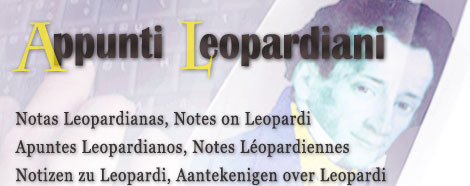
Notes on Leopardi
Appunti leopardiani, Special Issue
This special issue of Appunti leopardiani collects some of the contributions delivered on the Leopardi day held at the University of Birmingham on 15 February 2011 with the title: Variants on Loss and Silence in Leopardi.
The entries “loss” (perdita) and “mourning” (lutto) are missing from the analytical index of Giacomo Leopardi’s Zibaldone di pensieri (and from Leopardi’s own indexes too); perhaps not so surprisingly, as the rubrics “pleasure” and “suffering” with their multiple subheadings (including Teoria del piacere, and Piacere nella disperazione e nel dolore) seem to already encapsulate in many ways the other two motifs. From his earliest poetic writings–«La morte di Ettore», the drafted tragedy «Maria Antonietta», and the «Argomenti di elegie», to name but a few–Leopardi drew on these motifs for inspiration. However, loss and mourning are not only present in his work as marks and echoes of death, lending themselves to set up a human drama. They also are, to a large extent, metaphors for silence: the silence of individuals’ and people’s histories, but also the dazzling silence with which humans respond to overwhelming feelings: «Il silenzio è il linguaggio di tutte le forti passioni, dell’amore […] dell’ira, della maraviglia, del timore ec.» says Leopardi in the Zibaldone.Furthermore, in positing that «le ragioni e maniere occulte dell’esistenza […] noi non conosciamo nè intendiamo punto, […] neppur quanto alla nostra specie e al nostro proprio individuo», Leopardi also insinuates that silence marks the impossibility for the human mind, and, accordingly for language, of capturing the ultimate meaning of man’s existence.
The essays collected in the section « Articles» of the journal explore different manifestations of the themes of loss and mourning, and of the adjoined motifs of silence, lack, absence, nothingness, anguish, grief and sorrow that inform Leopardi’s uninterrupted reflection upon the essence of human life.
Notes on Leopardi is an on-line journal inspired by the programme "Leopardi nel mondo" ("Leopardi in the World") launched by the Centro Nazionale di Studi Leopardiani (CNSL). It aims to overcome geographical boundaries and specialist criticism in order to promote in all continents the name and work of the great writer from the small village of Recanati. Notes on Leopardi is the first on-line journal dedicated to Leopardi, and also the first one hosted in South America, at the Universidade Federal de Santa Catarina/Florianopolis in Brasil. In addition, it is the first publication on the topic to welcome contributions in multiple European languages. It hopes to offer also to a non-specialist public, to admirers and to 'new' Leopardi recruits more opportunities for reading and thinking about him. The journal will consist of six sections:Articles, interviews, poems (inspired by Leopardi) and translations (of Leopardi's texts), and reviews. poems (inspired by Leopardi) and translations (of Leopardi's texts). It will host a discussion blog as well as an annotated bibliography on publications and doctoral theses written on Leopardi around the world.